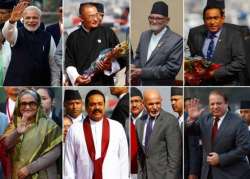18th SAARC Summit to begin in Kathmandu today
Kathmandu: The 18th SAARC Summit begins here on Wednesday with focus on deeper integration among the eight South Asian neighbours, amid high hopes that the leaders of India and Pakistan will meet to break their

Kathmandu: The 18th SAARC Summit begins here on Wednesday with focus on deeper integration among the eight South Asian neighbours, amid high hopes that the leaders of India and Pakistan will meet to break their diplomatic ice.
With speculation mounting that Prime Ministers Narendra Modi and Nawaz Sharif of Pakistan may meet on the sidelines of the summit, Indian External Affairs Minister Sushma Swaraj briefly met and shook hands with Sartaj Aziz, the national security adviser to Sharif, on Tuesday.
But when journalists wanted to know if the handshake held a larger meaning amid the thaw in India-Pakistan ties, Sushma Swaraj said: "It was out of courtesy. If you meet ministers of other countries, you greet each other."
A senior Nepali diplomat said that Sushma Swaraj and Aziz addressed each other by their first names.
Although India and Pakistan have not sought a meeting with one another, Nepalese officials appear confident that Modi and Sharif will surely meet, or at least greet one another, at the inaugural on Wednesday.
Nepal has said it wants to facilitate a Modi-Sharif meeting, at least during the retreat on Thursday.
Tensions between India and Pakistan are viewed as a major roadblock to a better integration of the South Asian Association for Regional Cooperation countries. The bloc will mark its 30th year in 2015.
Afghanistan, Bangladesh, Bhutan, India, the Maldives, Nepal, Pakistan, and Sri Lanka comprise the SAARC.
In his departure statement, Modi said though it was his first SAARC Summit, he had interacted extensively with leaders of South Asian nations during his swearing-in ceremony on May 26 this year.
The meeting then between Modi and Sharif had triggered high hopes of normalization of India-Pakistan ties, but frequent border firing incidents as well as the Kashmir row brought in the usual bitterness.
"Development of close relations with our neighbours is a key priority for my government," Modi said before leaving for Nepal.
He said he hoped the summit would lead to concrete outcomes, particularly regarding the various initiatives on enhancing connectivity that have been discussed for a long time.
Sushma Swaraj said at the SAARC Council of Ministers meeting here on Tuesday that the Modi government's three Cs (Culture, Commerce, Connectivity) were also aimed at deepening regional integration to push development.
She said the South Asian Free Trade Area (SAFTA) has given some momentum to intra-SAARC trade but it still remains far below potential.
"India has already taken several measures to boost intra-regional trade, including providing duty-free access to goods from SAARC least developed countries. It is time for us now, in the 30th year of SAARC, to ... build pan-SAARC projects which can realise what our predecessors aspired for," she said.
India's stress on greater intra-regional connectivity and development in the region comes amid China's push to elevate its role in SAARC from an observer to that of an active member.
This time Beijing has reportedly fielded top Nepalese politicians and diplomats to push for its membership in the grouping - a move New Delhi is resisting.
China said Tuesday that it wants to enhance its partnership with SAARC.
Despite sharing social and cultural affinities, SAARC nations have not prospered as a regional bloc -- unlike the European Union or the 10-member Association of Southeast Asian Nations (ASEAN).
The South Asian region is home to almost one-fifth of humanity and two-fifths of the world's poor. The total GDP of the member states is only three percent of the world total.
South Asian economies are least integrated, with intra-regional trade stagnating at around 5.76 per cent of the total trade, compared with 61.83 per cent in the European Union.
SAARC has nine observers: Australia, China, European Union, Iran, Japan, South Korea, Mauritius, Myanmar and the US.